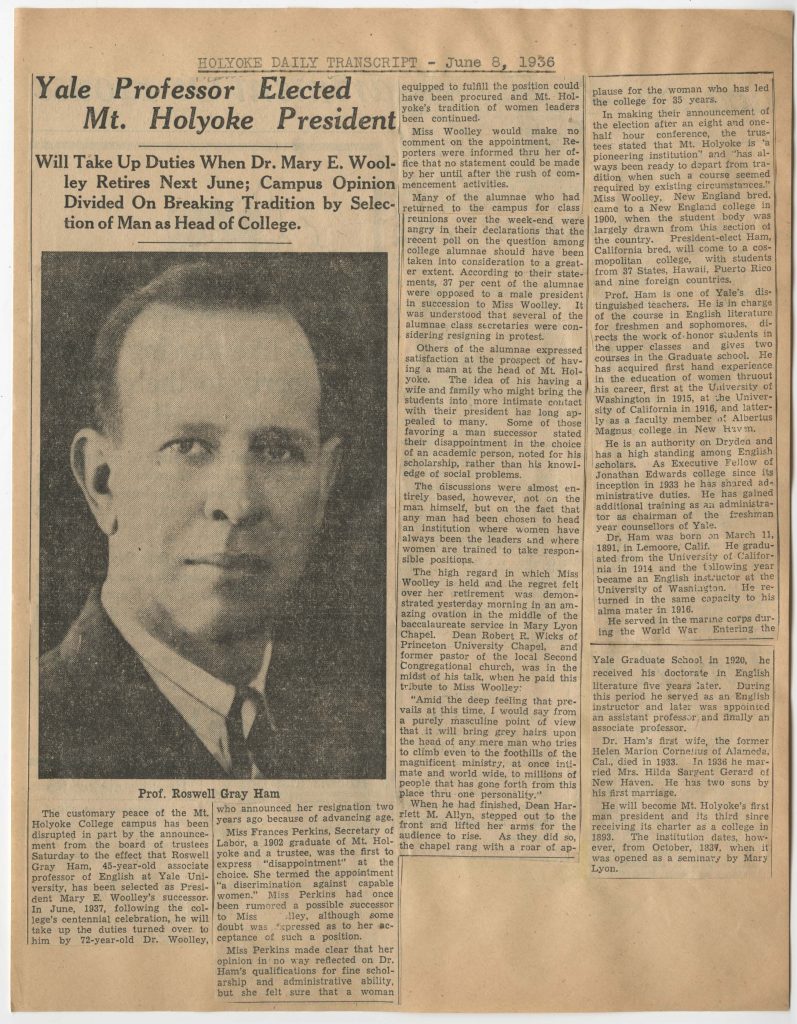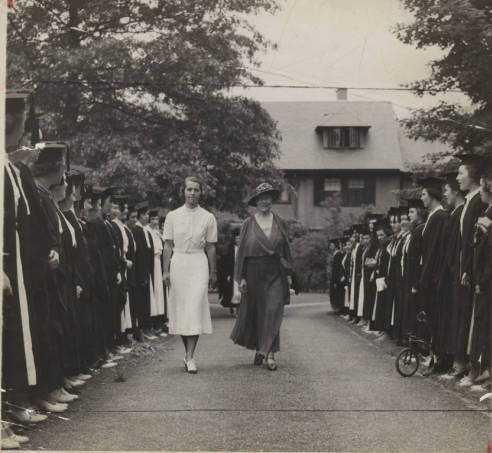
“You are right in thinking that there are difficulties even in being a woman! I must be effective, but not aggressive; womanly but not womanish; equal to social obligations but always on hand for the business ones; informed, but unable to take my pipe and join other ‘pipers’ in the corridors during translations — — et cetera, et cetera!!” – Excerpt from a letter, sent by Mary Woolley to Jeannette Marks on April 22, 1932.
In 1932, Mary Woolley was appointed by President Herbert Hoover to serve as the only woman delegate from the United States to the Conference on Reduction and Limitation of Armaments, also known as the World Disarmament Conference, in Geneva, Switzerland. She left by boat in January, and by April, she expressed to Marks the difficult and contradictory expectations she faced as one of the few women at the conference (in the above quote).
At the start of the 1930s, Marks was finding her greatest passion at the College in the Laboratory Theatre, which she founded in 1928. The Lab Theatre put on its own original productions, and was the predecessor to today’s Rooke Theatre. During Woolley’s frequent absences from the college, Marks kept her updated on tensions and dramas among the faculty. In a letter to Woolley from July 17, 1931, she regretfully describes the “disagreeable publicity” regarding Mr. Skinner leaving the Board of Trustees.
Woolley returned from Geneva to South Hadley in 1933, after talks broke down due to Hitler withdrawing Germany from the Conference and the League of Nations. In her last years as College President, Woolley advocated for faculty rights and fought to limit the Trustees’ growing influence over academic decisions. After leading the College into a new century, many of the Trustees, along with some alumnae and faculty, questioned her suitability based on her presidential methods and relationship with Marks. Because she was still very popular with students and most faculty, only a few, such as physics Professor Rusk, made public their opinion that her lack of a “normal” marriage and family life was troubling.

The Committee of Nine was formed in 1936 to search for and appoint Mary Woolley’s replacement as President of Mount Holyoke College. Woolley was aware that for the last several years of her presidency, the Board of Trustees was searching for a “family man,” while she and others suggested names of qualified women. Despite a great deal of opposition to the replacement of Woolley by a male president, the Committee, the Trustees, and the majority of the alumnae voted for Roswell Ham as her successor. Woolley, Marks, esteemed alumna and Trustee Frances Perkins, and many others felt that the Mount Holyoke ideals of women’s education were deeply betrayed by his appointment as the College’s first male president.
Many at the College blamed Marks for the protests against Roswell Ham’s appointment, even though she was not alone in her outrage. Woolley’s deep commitment to peace, which, along with Marks’ socialist sympathies, raised the specter of communism, was another reason many thought her time at Mount Holyoke should be over.
The centennial of the College in 1937, the same year of Woolley’s (essentially forced) retirement, became a lightning rod of controversy. In 1936 Woolley told the Trustees that she would not attend the event. Because nearly everyone agreed the centennial would not be complete without her, they moved the celebration sooner, and after much persuasion, she eventually agreed to attend. The centennial was planned by 41 committees, and almost 14,000 invitations were sent. Woolley took over the planning of the event from Edgar S. Furniss, one of the Trustees, and made sure that all of the speakers were extremely accomplished women. Perkins and Woolley sat together at the celebration, and while Woolley had initially wanted not to give a speech, in the end she briefly spoke about Mount Holyoke’s international aims and her vision for the future, to a standing ovation from the crowd.
The centennial celebration was Woolley’s last time at Mount Holyoke, the place that had been her personal and professional home for over thirty years. Marks, however, continued as a professor until 1941.
For more information about the Committee of Nine and the appointment of Roswell Ham as the President of Mount Holyoke, see A Male President for Mount Holyoke College: The Failed Fight to Maintain Female Leadership, 1934-1937 by Ann Karus Meeropol, published by McFarland in 2014, and available online to members of the Five Colleges here.